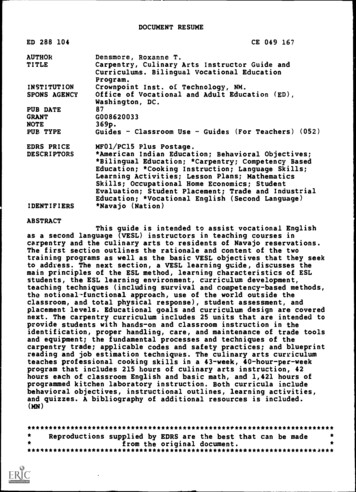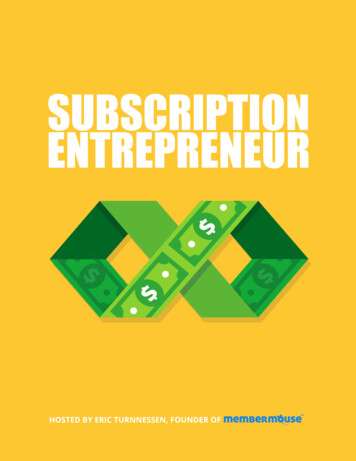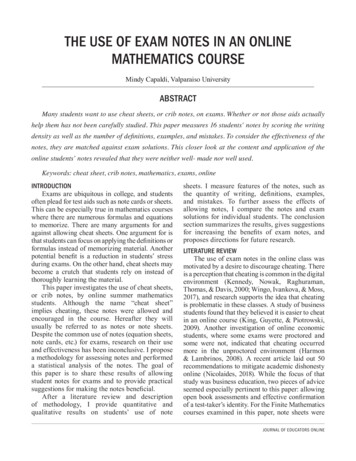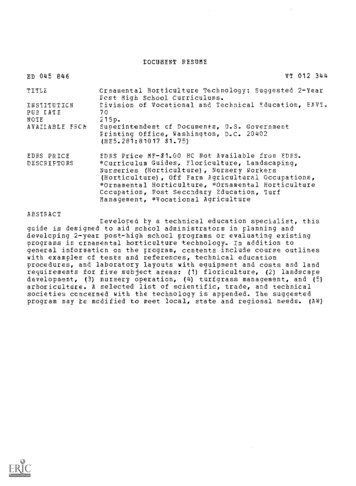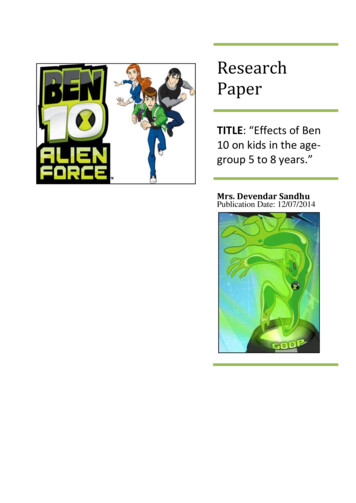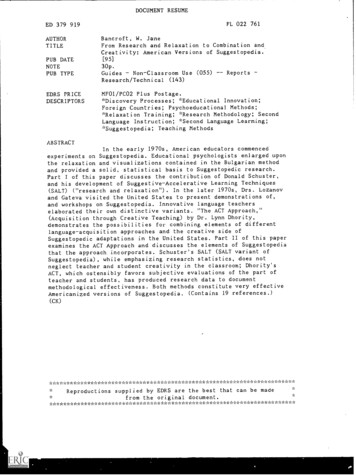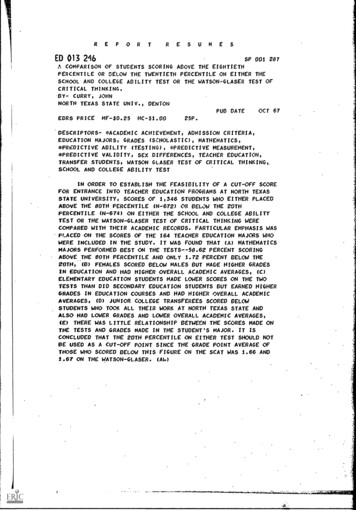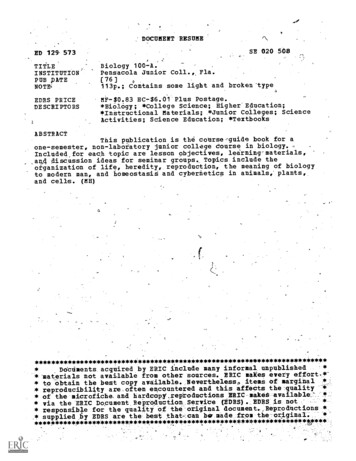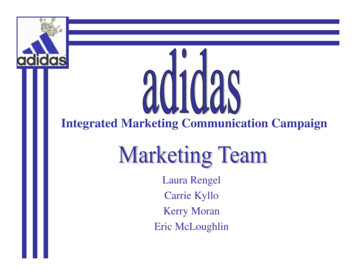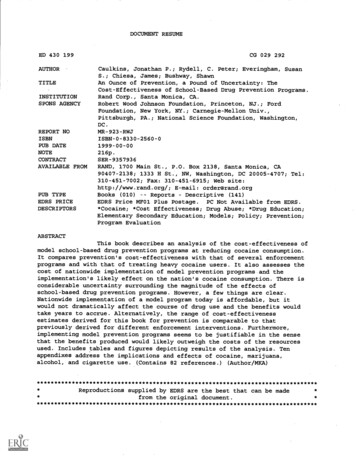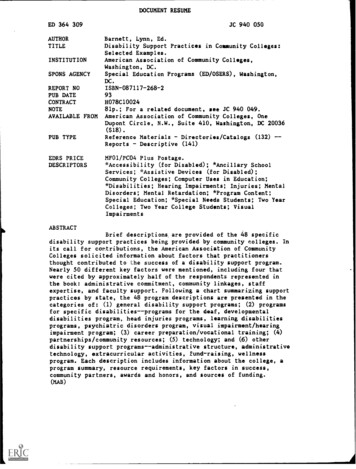
Transcription
DOCUMENT RESUMEED 364 309AUTHORTITLEINSTITUTIONSPONS AGENCYJC 940 050Barnett, Lynn, Ed.Disability Support Practices in Community Colleges:Selected Examples.American Association of Community Colleges,Washington, DC.Special Education Programs (ED/OSERS), Washington,DC.REPORT NOPUB DATECONTRACTNOTEAVAILABLE FROMISBN-087117-268-293H078C1002481p.; For a related document, see JC 940 049.American Association of Community Colleges, OneDupont Circle, N.W., Suite 410, Washington, DC 20036PUB TYPEReference MaterialsDirectories/Catalogs (132) -ReportsDescriptive (141)EDRS PRICEDESCRIPTORSMF01/PC04 Plus Postage.*Accessibility (for Disabled); *Ancillary SchoolServices; *Assistive Devices (for Disabled);Community Colleges; Computer Uses in Education;*Disabilities; Hearing Impairments; Injuries; MentalDisorders; Mental Retardation; *Program Content;Special Education; *Special Needs Students; Two YearColleges; Two Year College Students; VisualImpairments( 18).ABSTRACTBrief descriptions, are provided of the 48 specificdisability support practices being provided by community colleges. Inits call for contributions, the American Association of CommunityColleges solicited information about factors that practitionersthought contributed to the success of a disability support program.Nearly 50 different key factors were mentioned, including four thatwere cited by approximately half of the respondents represented inthe book: administrative commitment, community linkages, staffexpertise, and faculty support. Following a chart summarizing supportpractices by state, the 48 program descriptions are presented in thecategories of: (1) general disability support programs; (2) programsfor specific disabilities--programs for the deaf, developmentaldisabilities program, head injuries programs, learning disabilitiesprograms, psychiatric disorders program, visual impairment/hearingimpairment program; (3) career preparation/vocational training; (4)partnerships/community resources; (5) technology; and (6) otherdisability support programs--administrative structure, administrativetechnology, extracurricular activities, fund-raising, wellnessprogram. Each description includes information about the college, aprogram summary, resource requirements, key factors in success,community partners, awards and honors, and sources of funding.(MAB)
;MOM.c,Afr.1Disability Supmport Practicesin Communityr Colleges:Selected Examplese,-,(17A IIrkd H)( .1;11( )1(I1I 1Ii1(
Disability Support Practicesin Community Colleges:Selected ExamplesLynn Barnett, EditorA project of the American Association of Community Collegeswith funding from the U.S. Department of Education
Disability Support Practices in Community Colleges: Selected ExamplesLynn Barnett, Project DirectorAllan Jimenez. Staff AssistantLaura Guimond. Design ConsultantThis publication has been ,repared under Grant No. H078C10024 with the U.S. Department, OffIce ofSpecial Education Program., awarded to the American Association of Community Colleges. The contentsdo not necessarily reflect the views of the U.S. Government, nor does mention of products ororganizations imply endorsement by the U.S. Government. (Dollar amount of federal funds for grant: 94,056; percent of total project financed by federal money: 72%)American Association of Community CollegesNational Center for Higher EducationOne Dupont Circle, Suite 410Washington, DC 20036(202) 728-0200Copyright 1993Printed in the United States of AmericaISBN-0-87117-268-2Printed on recycled paper
PREFACECommunity colleges serve a larger proportion of studentswith disabilities than any other segment of postsecondaryeducation. As a result of this experience, they havedeveloped effective and creative disability support practicesand programs that help these individuals reach their fullest potential. This book describes 48 of those practices and programs. Someare general disability support programs for all students with disabilities, others are directed toward specific audiences or particulargoals. Together, they should serve as a resource for administratorsand practitioners looking for practical solutions.This book follows the 1992 publication of the Directory of DisabilitySupport Services in Community Colleges, which profiled services atmore than 600 institutions. The programs and practices presentedhere were selected by an external panel of experts from nearly 150entries submitted in response to AACC's nationwide "Call for Contributions."Both the directory and this book were made possible by a grant fromthe U.S. Department of Education, Office of Special EducationPrograms. Special appreciation is extended to Rhona Hartman,Director of the HEATH Resource Center at the American Council ofEducaton, Washington, DC; to Kathleen McLane, Associate Directorof the ERIC Clearinghouse on Disabilities and Gifted Education, atthe Council for Exceptional Children, Reston, Virginia; to staff andmembers of the Association for Higher Education and Disability(AHEAD) for their advice and assistance; and to members of theexternal review panel. Most importantly, AACC is indebted to thepresidents and staffs of community colleges who serve students withdisabilities and made this publication possible.David PiercePresidentAmerican Association of Community CollegesNovember 19935Disability Support Services In Community CollagesPage III
.11Linda Belk, LEAP administrative assistant, looks on asKevin Taylor, York Tech graduate and LEAP participant,prepares for his presentation to the College Foundation.BEST COPY AVAILABLEPage lvDisability Support Services in Community Collages
TABLE OF CONT NTSINTRODUCTION1DISABILITY SUPPORT PRACTICES BY STATE2GENERAL DISABILITY SUPPORT PROGRAMS5Blue Ridge Community College7Catonsville Community College8Community College of Rhode Island9Leeward Community College (University of Hawaii Community College System).10Monterey Penlnsula College11Mount Wachusett Community College12New River Community College13Normandale Community College14Palomar College15Spokane Community College16Waubonsee Community College17William Rainey Harper College18PROGRAMS FOR SPECIFIC DISABILITIES1921PROGRAMS FOR THE DEAFLaGuardia Community College (City Univers Ity of New York)21Northern Essex Community College22()None College2324DEVELOPMENTAL DISABILITIES PROGRAMOxnard College (Ventura County Community College District)2425HEAD INJURIES PROGRAMSCoastline Community College25Richland CollegeDallas County Community College District26LEARNING DISABIUTIES PROGRAMS27Middlesex County College27Montgomery College28Ocean County College29Parkland College30York Technical College31PSYCHIATRIC D:SORDERS PROGRAM32Santa Barbara City College3233VISUAL IMPAIRMENT/HEARING IMPAIRMENT PROGRAM33Northcentral Technical CollegeDisability Support UM COS In Community Colleges7Page v
CAREER PREPARATION/VOCATIONAL TRAINING35Chippewa Valley Technical College37Communtty College of Allegheny County-North Campus38Community College of Denver39Fresno aty CollegeIndian River Community College41Lake Washington Technical College42The Metropolitan Community Colleges43PellIssippl State Technical Community College44Waukesha County Technical College4547PARTNERSHIPS/COMMUNITY RESOURCESAshevIlle-Buncombe Technical Community College49Columbus State Community College50Delaware Technical and Community Cc 9ge. Southern Campus51Gavilan Joint Community College Dlstrict52TECHNOLOGY53Butte College55Clackamas Community College56Colorado Community College and Occupational Education System57Grossmont College (Grossmont-Cuyamaca Community College District)5859OTHER DISABILITY SUPPORT PROGRAMSADMINISTRATIVE STRUCTURE61Front Range Community College61John Wood Community College62ADMINISTRATIVE TECHNOLOGY63Community College of Aurora6365EXTRACURRICULAR ACTIVITIESDabney S. Lancaster Community College65FUND-RAISING66Columbia Basin College66WELLNESS PROGRAM67Del Mar College67INDEX69SELECTED REFERENCES738Pogo vlDisability Support Services In Community Collages
This book was compiled in response tc requests for examples ofspecific disability support practices in community colleges. The48 practices described here were selected by an external reviewpanel from among more 150 entries submitted by communitycolleges nationwide. Several were winners in the award competitionsponsored jointly by AACC, the National Organization on Disability,and J.C. Penney during the past five years. Other national, regional,or local organizations have recognized many of the practices for theireffectiveness and contributions to their communities.In its "Call for Contributions," AACC solicited information aboutfactors that practitioners thought contributed to the success of adisability support program. Nearly 50 different "key factors insuccess" were listed. Among them, four factors stand out. Each ofthe four was cited by approximately half of the 48 respondentsrepresented in this book. They are:* Administrative commitment* Community linkages* Staff expertise* Faculty supportInterestingly, three of these four factors have to do with institutionalcommitment and support. This may suggest the importance of a"can do" approach to disability support services. Following closebehind the top four factors were a student-oriented approach andstable funding. Further down the line were creativity and flexibilityin service delivery, job transition or placement activities, comprehensive student support services, assistive technology, and a structuredcurriculum.The prevalence of community connections is not surprising in thecommunity college environment, where community involvement ispart of the institutional mission. The range of cooperating organizations is impressive: business and industry, disability support ser-vice providers, state and local agencies, community-basedorganizations, other educational institutions, charitable organizations and foundations, and private citizens. Specific linkage initiatives range from service referrals to advisory councils to studentinternships with local employers.These examples show that community collegesrural, urban, orsuburbanare developing innovative approaches to meet students'special needs.9Disability Support Practices In Community CoilegesRigs 1
AaCAID46AINSTITUTIONPROGRAMButte CollegeComputer Access Resource and Learning Operation(CARLO)Coastline CCTraumatic Head Injury (1H) ProgramFresno City CollegeEnabler ProgramGavilan Joint CC DistrictJOBFINDEPSGrossmont CollegeAdapted Computer High Tech Center ProgramMonterey Peninsula CollegeSupportive ServicesOh lone CollegeDeaf CenterOxnard CollegeOC-INTRA (INstruction for TRAnsItion)Palomar CollegeDisabled Student Programs and ServicesSanta Barbara City CollegeStudents with Psychological Disabilities ModelService SiteColorado CC andOccupational Education SystemComputer Access CentersCC of AuroraCustomized Computer AccountingCC of DenverComputer Training for People with DisabilitiesFront Range CCDisability Services Work GroupDEDelaware Technical and CCStudent Support ServicesFLIndian River CCCareer Empowerment Opportunities (CEO) ProjectHILeeward CCKomo Mal CenterILJohn Wood CCSupport Services CenterParkland CollegeLearning Resource ProgramWaubonsee CCDisabled Student ProgramsWilliam Rainey Harper CollegeCenter for Students with DisabilitiesMount Wachusett CCTeam for Students with DisabilitiesNorthern Essex CCSpecial Services for Deaf and Hard of Hearing PeopleCatonsville CCSupport Services for Students with DisabilitiesMontgomery CollegeLearning Center ProgramNorrnandale CCDesigning Educational Experiences for DisabledCOMAMDMNStudents (DEEDS)10Page 2Disability Support Practices in Community Colleges
DIS.ABILIT'Y SUPPORT PRACTICES B1) , STATEINSTITUTIONPROGRAMMOThe Metropolitan CCsWork AbilityNCAsheville-Buncombe Technical CCSpecial NeedsBlue Ridge CCSpecial Populations OfficeMiddlesex County CollegeProject ConnectionsOcean County CollegeProject Academic Skills Support (PASS)NYLaGuardla CCProgram for Deaf AdultsOHColumbus State CCProject BOSS (Business Opportunity Success System)ORClackamas CCTraining In Adaptive Computer Technology (TACT)ProgramPACC of Allegheny CountyVocatlonal Training Programs for Spec lal Need AdultsRICC of Rhode IslandAccess to OpportunitySCYork Technical CollegeLearning Enhanced Achievement Program (LEAP)TNPellissippi State Tech CCMicrocomputer Office Software Training (MOST)TXDel Mar CollegeWellness CenterRichland CollegeTotal Re-Integration (TRI) ProgramDabney S. Lancaster CCCHAMPS ClubNew River CCComprehensive Services for Students with DisabilitiesColumbia Basin CollegeEducation Access ServicesLake Washington Technical CollegeElectron lc ManufacturingSpokane CCDisability Student ServicesChippewa Valley Technical CollegeProject SERVENorthcentral Technical CollegeVisually-Impaired Persons (VIP) ProgramHearing-Impaired Persons (HIP) ProgramWaukesha County Technical CollegeCareer Placement ServicesNJVAWAWI11'Disability Support Practices In Community CollegesPage 3
"-111.14144.4(,Prisoners at Sussex Correctional Institute with Del Tech quadriplegic student,John Jefferson, and SCI educational supervisor, Chuck Laws.BEST Cin AVAILABLEPage 412Disability Support Practices In Community Collages
* GENERAL DISABILITY SUPPORT PROGRAMS *I1Disability Support Practices In Communliy Colleges3Page 5
Ajit.1)e.:(ti LJ.(,'WttW4)r44446-,'A New River Community Colleg student receives assistance from an interpreter and amember of the college's tutoring staff.Photo credit: Eric Brady14AVM flLEPage 6Disability Support Practices in Community Colleges
GENERAL DISABILITY SUPPORT PROGRAMSSpecial Populations OfficeBlue Ridge Community CollegeCollege DriveFlat Rock, North Carolina 28731President: David W. SinkContact: Victoria E. McKee(704) 692-3572, ext. 290Year program established: 1991Number of individuals served per year: 335Total college credit enrollment: 1,313Program Summary:Blue Ridge Community College is a small, rural college that has seen nearly a doubling of the number ofstudents with disabilities between 1991 and 1992. This growth is attributed to the increased recognitionof the spirit and capacity of the Special Populations Office. Wise utilization of resources permits the officeto provide services beyond "reasonable accommodations" and to offer additional support through theComputer Learning Lab and community consultants. The Computer Learning Lab, funded by a privategrant, specializes in equipment and software designed to meet the needs of individuals with visual,hearing, physical, and cognitive disabilities. To promote academic success, the college offers studentsequipment, counseling, notetakers, readers, interpreters, special test administration, and pre-diagnostictesting. Information about student needs are relayed to each instructor every quarter through anIndividualized Action Plan. Mid-term progress reports provide a formalized assessment of student successand allow for intervention to reduce the chance of failure. The office also coordinates the Peer ThtoringProgram, which offers additional support to all students at the college. The Special Populations Officehas earned the respect of the community, which often asks for special consultations, particularlyregarding brain injury. Staff assist in finding independent living resources and opportunities, sometimesincluding enrollment at the college.Resource Requirements:Full-time coordinator, part-time assistant; IBM PCs and Macinto5. assistive technology (e.g. talkingcalculator, Listenaider, magnifying technology, speech synthesizer, expanded keyboard)Key Factors in Success:* Student-oriented programming* Accessibility of support services* Timely provision of accommodations* i-Alministrative and faculty support* Community linkagesCommunity Partners:Asheville-Buncombe Technical Community College; Employment Security Commission; Governor's Advocacy Council for Persons with Disabilities; Henderson County Department of Social Services; HendersonCounty Public Schools; Henderson County Sheltered Workshop; Hendersonville Mayor's Committee forPersons with Disabilities; North Carolina Division for the Blind; North Carolina Division for the Deaf andHard of Hearing; North Carolina Head Injury Foundation Professional Council; Thoms RehabilitationHospital; Trend Community Mental Health; Vocational RehabilitationSources of Funding:Perkins funds; Melvin R Lane Charitable Trust; college fundsDisability Support Practices In Community CollegesLiPage 7
GENERAL DISABILITY SUPPORT PROGRAMSSupport Services for Students with DisabilitiesCatonsville Community College800 S. Rolling RoadBaltimore, Maryland 21228President: Frederick J. WalshContact: Jill Brooks(410) 455-4718Year program established: 1978Number of individuals served per year: 225Total college credit enrollment: 12,856Program Summary:Catonsville offerL, a variety of services to students with disabilities, including counseling for personal.career, and academic concerns; interpreters for the classroom as well as for other non-campus events;notetakers, readers, and tutors; and alternative test-taking arrangements. The college offers specificservices depending on the needs of the students with disabilities. For blind and visually impairedstudents, computer literacy training with voice-supported terminals is provided. For deaf and hard-of-hearing students there are special classes using computer-assisted instruction to improve reading,writing, and communications skills. They also participate in a deaf club sponsored through StudentActivities. Assistive listening devices are available for the hard-of-hearing. Services for students withlearning disabilities include the use of the Learning Assistance Center, which uses adaptive equipmentto help students in their individual coursework.Resource Requirements:Staffi coordinator/counselor for students with disabilities, counselor for students with learning disabilities, counselor for students with visual impairments, part-time coordinator of interpreter services,coordinator of readers/notetakers/tutors, academic skills specialist, 12 freelance interpreters, 12notetakers/readers/tutors, 4 student aides. Facilities/ equipment 10 TlYs on campus, 1 TlY pay phone,voice supported computers, portable science lab station for wheelchair users, visual teks, 4 assistivelistening devices, 7 IBM and 5 Macintosh computers, Kurzweil reader, Zoom Text, Arkenstone Reader,software (Soundproof, Bookwise, Outspoken, Write Out Loud, Dragon Dictate), two Easy Listeners.Key Factors in Success:* Adequate student support services* Counseling services* Faculty's positive attitude* Assistive computer technologyAwards/Honors:Outstanding Program, AACC/National Organization on Disability/J.C. Penney, 1989Sources of Funding:College operating budget; Title III16Page 8Disability Suppod Practices in Community Colleges
GENERAL DISABILITY SUPPbRT PRbI3A,,Access to OpportunityCommunity College of Rhode Island400 East AvenueWarwick. Rhode Island 02886President: Edward J. ListonContacts: Julie M. White(401) 825-2305Pamela A. Rohland(401) 825-2369Year program established: 1980Number of individuals served per year: 120Total college credit enrollment: 17,986Program Summary:The goal of the Access to Opportunity program is to ensure retention, graduation, and transfer ofparticipants. It offers a comprehensive program of support including orientation, academic advising,career exploration, transfer advising, tutoring, and adjustment counseling. It also coordinates the useof adaptive equipment and support services. Access has achieved a retention rate of 89 percent since itsinception in 1980. Features that contribute to that retention include early advising about transfer tofour-year colleges and a mini-transfer fair with a panel of past students. The Transition to Employmentprogram, begun in 1984, works with a network of area employers to help students with disabilities enterthe job market. The program aims to increase employer awareness, imp
Computer Access Centers. Customized Computer Accounting Computer Training for People with Disabilities. Disability Services Work Group. Student Support Services. Career Empowerment Opportunities (CEO) Project Komo Mal Center Support Services Center Learning Resource Program. Disabl

